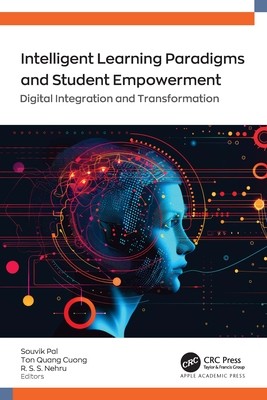
- We will send in 10–14 business days.
- Publisher: Apple Academic Press
- ISBN-10: 1774915960
- ISBN-13: 9781774915967
- Format: 15.6 x 23.4 x 1.9 cm, kieti viršeliai
- Language: English
- SAVE -10% with code: EXTRA
Intelligent Learning Paradigm and Student Empowerment (e-book) (used book) | bookbook.eu
Reviews
Description
The Covid-19 pandemic brought about dramatic change in the education sector, deeply affecting schools as they were forced to shut down and as online learning became common. Post-Covid, it is clear that many of the practices brought about by the pandemic are actually beneficial in education in the long run. This new volume, Intelligent Learning Paradigm and Student Empowerment: Digital Integration and Transformation, explores the development and evolution of smart learning, learning analytics, intelligent learning, and the Internet of Things as they pertain to student empowerment in the classroom.
The book covers a wide range of topics on digital pedagogy, including educational robotics, immersive technology-based education systems, interactive e-books, using virtual reality and augmented reality (XR) technology, online proctoring, digital transformation of teaching method modules, and much more.
Key features:
- Incorporates and transforms digital pedagogy across the board of functional processes
- Explores state-of-the-art smart tools in education
- Offers ideas for the successful transformation to digital teaching methods
- Discusses how digital education can foster student agency and promote cross-disciplinary collaboration
With contributions from leading academic policymakers, researchers, educationalists, and education scholars, this volume will be valuable to academic and administrative decision-makers, education researchers, and others involved in advancing education in the post-Covid age.
EXTRA 10 % discount with code: EXTRA
The promotion ends in 21d.06:30:41
The discount code is valid when purchasing from 10 €. Discounts do not stack.
- Publisher: Apple Academic Press
- ISBN-10: 1774915960
- ISBN-13: 9781774915967
- Format: 15.6 x 23.4 x 1.9 cm, kieti viršeliai
- Language: English English
The Covid-19 pandemic brought about dramatic change in the education sector, deeply affecting schools as they were forced to shut down and as online learning became common. Post-Covid, it is clear that many of the practices brought about by the pandemic are actually beneficial in education in the long run. This new volume, Intelligent Learning Paradigm and Student Empowerment: Digital Integration and Transformation, explores the development and evolution of smart learning, learning analytics, intelligent learning, and the Internet of Things as they pertain to student empowerment in the classroom.
The book covers a wide range of topics on digital pedagogy, including educational robotics, immersive technology-based education systems, interactive e-books, using virtual reality and augmented reality (XR) technology, online proctoring, digital transformation of teaching method modules, and much more.
Key features:
- Incorporates and transforms digital pedagogy across the board of functional processes
- Explores state-of-the-art smart tools in education
- Offers ideas for the successful transformation to digital teaching methods
- Discusses how digital education can foster student agency and promote cross-disciplinary collaboration
With contributions from leading academic policymakers, researchers, educationalists, and education scholars, this volume will be valuable to academic and administrative decision-makers, education researchers, and others involved in advancing education in the post-Covid age.


Reviews